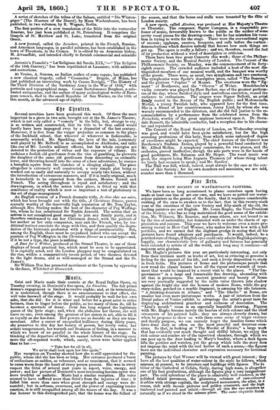t4t1iTti.
Several novelties have been produced this week. Of these the most important is a piece in two acts, brought out at the St. James's Theatre, which is not only called a "comedy" in the bills, but, strange to say, is so written and constructed, that its title to be thus called would hardly have been impugned even by a dramatist of the last century. Moreover, it is free from the vulgar prejudice so common to the plays of the Inelbald school, that whoever or whatever is fashionable, is necessarily wicked. Mr. Sparkling, the hero of the tale, (extremely well played by Mr. Belford) is as accomplished as Alcibiades, and talks like one of Mr. Leech's military officers, but his whole energies are devoted to the protection of virtue and the exposure of villany. He reclaims a foolish old gentleman from the vice of gambling, he prevents the daughter of the same old gentleman from discarding an estimable lover, and throwing herself into the arms of a base adventurer, he rescues a bumpkin squire from the clutches of a clinging abigail. The piece altogether is extremely well constructed, a very simple plot being so worked out as easily and naturally to occupy nearly two hours, without the introduction of extraneous manners, and if it is really original, much is henceforth to be expected from the authors, Messrs. Sorrell and French. The acting throughout is equal and satisfactory ; and the drawingroom, in which the action takes place, is fitted up with that semblance of reality which is now so important a test of proficiency in the art of stage-management. An English version of a French dramatic trifle, ,Te dine chez ma snare, which has been brought out with the title, A Christmas Dinner' proves scarcely worthy of the deservedly high reputation of Mr. Tom Taylor, although Mrs. Stirling makes the best of the character of Peg Woffing- ton, whom he has substituted for Sophia Arnould. The notion that an actress is not considered good enough to join any family party, and is therefore condemned to eat her Christmas dinner, with the portrait of her mother as her only companion, may suit the French, who, by tra- ditional instinct associate the stage with vice, and then qualify the degra- dation of the histrionic profession with a tinge of sentimentality. But, among the English, those must be prejudiced indeed who can accept the position of Peg Woffmgton in the Christmas Dinner as a social type—and, if it be not a type, the piece is nothing.
A Race for a Widow, produced at the Strand Theatre, is one of those displays of broad practical fun, which must be seen to be appreciated. It is capitally acted, and the London playgoer may be congratulated on the rise, within a comparatively recent period, of two theatres devoted to the light drama, and so well-managed as the Strand and the St. James's.
Sir William Don has promoted merriment at the Lyceum by appearing in the farce, Whitebait at Greenwich.


























 Previous page
Previous page